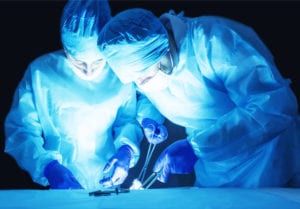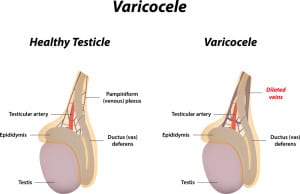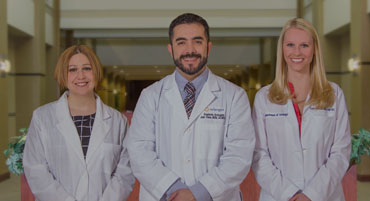Varicoceles Treatment in Chattanooga, TN
What is a varicocele?
Varicoceles are enlarged veins found within the scrotum above the testes, and are often described as having a “bag of worms”. They are relatively common and affect about 15% of males. These veins start enlarging during puberty and can increase in size over time. They are more common on the left side of the scrotum. Usually they are harmless and cause no symptoms. Occasionally they can lead to male infertility, mild to moderate testicular pain and in some cases lower testosterone.
Varioceles are the most common correctable form of male infertility. Approximately 40% of men evaluated for infertility have a varicocele.
Click to Call Dr. Shrid Today to Learn More
Who Is an Ideal Candidate for Varicocele Repair?
The vast majority of varicoceles do not cause pain. However, this condition can contribute to infertility. Doctors consider several factors when determining whether a varicocele should be treated. These include the presence of a varicocele in the male partner of a couple experiencing infertility, normal fertility in the female partner, and abnormal semen parameters or sperm function in the male partner. Adult men who are not currently trying to conceive but want to preserve future fertility may also be good candidates for microsurgical varicocele repair. To determine candidacy for this procedure, Dr. Shridharani performs a thorough consultation and medical history review as it pertains to fertility and varicocele symptoms. Lab tests provide important clinical data, as well, that inform the doctor’s decision regarding treatment options. An alternative approach to surgical repair is to observe the varicocele over time and periodically measure semen parameters for indications of impaired testicular function.
How Long Does the Varicocele Repair Procedure Take?
The microsurgical repair procedure may take approximately one hour. After surgery, the patient will remain in the recovery area for some time to allow the general anesthesia to wear off. Patients are released to a loved one to drive them home once they have met the discharge criteria of the surgical center.
How Soon Will I See the Results of My Treatment?
The results of varicocele repair may be appreciated as soon as a few days to a few weeks after the procedure. While we expect some degree of post-surgical discomfort to require management with prescription or over-the-counter medication, patients with symptomatic varicoceles may notice an improvement in comfort right away. Additional results related to fertility are measured months after the procedure, at which time patients can observe improvements in semen parameters in comparison to pre-surgical data.
Can Varicoceles Be Avoided?
Little is known about the conditions that can lead to the dilation of veins in the scrotum. Therefore, experts in the field have no viable prevention strategies at this time.
Causes of a varicocele
Like varicose veins in the legs, the problem is that the valves in the veins do not work properly. This causes blood flow to slow and pool in the veins resulting in swelling of the veins. Another theory is that the anatomical position of the insertion of testicular veins into the veins that drain the kidney make the veins in the scrotum more likely to dilate.
What Problems Can Varicoceles Cause if Left Untreated?
Many theories of how varicoceles cause issues with male fertility and testicular pain have been proposed. The most popular theory relates to changes in testicular temperature. The temperature of the scrotum is usually slightly cooler than the rest of the body, that is why the scrotum hangs below the body. The dilated veins characteristic of varicoceles can overheat the testicles and reduce their function. Sperm growth and motility are particularly sensitive to their environment and are identified on semen analysis.
Pain may be caused by nerve inflammation related to the dilation of the veins. Some have also proposed that venous blood backflow or reflux can lead to nerve inflammation.
The potential risk factors for developing a varicocele
Generally, there are no established risk factors. Studies have previously stated that being overweight can be protective while being taller can be a risk factor. Most of the suggested risk factors have not been confirmed by well-performed studies and should not be considered as conclusive.
What are the symptoms of varicoceles?
- A lump or swelling on one of your testicles.
- Pain when standing or sitting for long periods which causes pressure to build in the affected veins.
- Prominent, visible veins in the scrotum.
- Fertility problems including decreased sperm count decreased motility and an increase in the number of deformed sperm.
- Atrophy (shrinking) of the affected testicle.
How is a varicocele diagnosed?
The gold standard is a physical examination. Varicoceles are usually graded on a scale of 1-3:
- Grade 1: The dilated veins are felt on exam when a Valsalva is performed (increasing the intra-abdominal pressure by straining)
- Grade 2: The dilated veins are felt without Valsalva, at rest
- Grade 3: The dilated veins are seen in the scrotum prior to feeling them
An ultrasound of the scrotum can diagnose varicoceles incidentally. Finding a varicocele on ultrasound does not change management and needs to be confirmed by a physical exam. Performing an ultrasound, after the varicocele is found on physical exam, is very unnecessary and is not recommended.
Varicocele Treatment Options

Microsurgical Varicocele Repair
Multiple types of varicocele repair have been described, however, microsurgical varicocele repair with the use of the operating microscope affords the best success rates, with the least complications and chance of recurrence. The dilated veins are repaired through a 2-3 cm incision located just above the scrotum in the lower groin area. The vas deferens, testicular artery and lymphatics in the spermatic cord are vital structures near the enlarged veins and are best visualized with the operating microscope. Those structures are gently separated from the veins which are subsequently divided with small clips. The incision is closed with dissolvable sutures and skin glue. The procedure is performed under a general anesthetic (you will be completely asleep) and men will go home the same day (outpatient procedure).
What are the results of varicocele repair?
Microsurgical varicocele repair usually yields a 70% improvement in semen parameters and a 40% pregnancy rate overall. Higher grade varicoceles tend to be more likely to improve as compared to smaller varicoceles. Usually the first semen analysis is obtained 3 months post-operatively to allow adequate time for the sperm that has not been exposed to the varicocele to predominate.
What is the recovery for varicocele repair?
The procedure is usually performed on a Friday and men who do not have a significant amount of hard labor can return to work the following Monday. Heavy lifting is not recommended for 2 weeks. Couples may resume sexual activity as soon as it’s comfortable.
Side effects and complications with a varicocele repair
Complications are relatively uncommon with this well-tolerated procedure. Most men complain of temporary discomfort at the incision. Hematomas or blood clots underneath the incision may occur. Wound infection, scrotal swelling on the side that was operated on and prolonged pain at the incision can occur but are uncommon. The chance of recurrence and damage to the blood flow in the testis is rare – less than 1%.
Schedule a Consultation Today
Varicocele Embolization
An alternative to microsurgical repair of varicoceles is embolization. Typically an interventional radiologist performs the procedure. Usually, a catheter is placed within the testicular vein under X-ray guidance. Coils or gels are deployed into the dilated veins to essentially clog them. This procedure is well tolerated and is performed on an outpatient basis. The chance the varicocele will come back with embolization is higher than with microsurgical repair. Further, this is a technically challenging procedure that should only be performed by those with extensive experience. We would only recommend embolization when a varicocele reoccurs after microsurgical repair.
Why Choose Dr. Shridharani for Your Varicoceles Treatment

Of the utmost importance, Dr. Shridharani will counsel you on all of the options and help find the treatment option for you that is cost-effective and agreeable to you and your partner. We understand that the journey to get pregnant when infertile can be particularly frustrating due to its lack of predictability and the patience required with the process. Therefore, we promote involvement in all aspects of the decision-making process and we find this empowers couples and improves satisfaction overall.
What People Say About Us!
“Extremely pleasant experience overall. The staff and nurses were very professional but also friendly. Dr. Shridharani was very professional, knowledgeable and also friendly. He talks in terms that the average person understands. Even tho I did not qualify for the procedure I came to see him about, he took lots of time to explain my options. I would highly recommend him and his staff.”
– Joseph S
Click here to read more reviews.
Schedule A Consultation
Contact Dr. Shrid Men’s Health & Microsurgery today or visit us in Chattanooga, TN to learn more about varicoceles. You can also call us at (423) 778-4MEN (4636).



